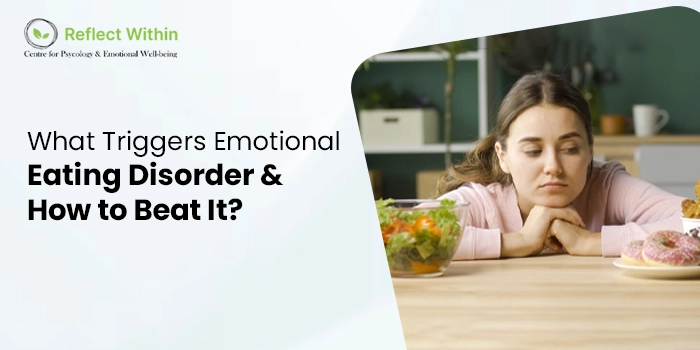What Triggers Emotional Eating Disorder & How to Beat It?

Do you rush to the kitchen to hog food whenever you feel upset, stressed, or have an emotional breakdown? If so, it can be an indication of an emotional eating disorder. Emotional eating is simply the urge to eat in response to one’s feelings or emotions. Every time, it’s not about satisfying the physical hunger, but people often eat to feel comfortable, get stress relief, and appreciate themselves. Well, this eating habit is quite common and can be coped with some suggested tips and strategies in this blog post. So, let’s start!
What Does the Emotional Eating Disorder Mean?
As briefed above, emotional eating is related to having food in response to emotions. For instance, one may order Pizza when feeling lonely or bored, crave ice ice-cream when feeling low or down, or reach a restaurant after ending a bad day. People crave and get such hogging urges every time when they are stressed, low, or emotionally broken. Eventually, they start developing an emotional eating disorder.
Certainly, when one chooses eating to beat their emotional breakdown or stress, they don’t find any other option as their coping strategy. Eventually, this eating habit may turn out to be a severe problem, causing prominent health issues, which we will discuss later in this post. However, many people also start carrying guilt and shame as they become unstoppable for their habit of emotional eating.
Now, you must be wondering about what mainly causes one to develop binge eating disorder while having stress or emotional issues. Is it? If so, read the next section to learn about the major causes.
Major Causes of Developing Binge Eating Disorder
There is a broad array of factors that can trigger a desire or urge to binge eat. Below, we have mentioned some of the most common ones:
1. Work Pressure or Stress
Today’s hectic 9-5 schedule is all about holding too much pressure and stress at the workplace. Therefore, many people opt for eating to release their stress, feel good, and uplift their sad mood.
2. Struggles in Relationships
Also, the binge eating disorder is quite common among couples having relationship issues. It’s because couples also opt for eating frequently to manage their stress and relationship issues.
3. Health Issues
Absolutely. Sometimes, health issues can become a prominent cause of developing a desire to binge eat and feel good. To beat the negative feelings triggered by health problems, people often choose food and overcome the negativity.
4. Overwhelming Feelings and Excitement
People, instead of dealing with feelings, sometimes use food to satisfy their overwhelming feelings and excitement. Many have been there, finishing the whole bag of chips or hogging cookie after cookie while feeling excited or overwhelmed about something.
5. State of Alexithymia
Alexithymia is one of the mental health issues and is defined as the lack of ability to process, understand, or describe what one feels. Hence, when a person is unable to describe their emotions or what they feel, they may use food to deal with their mental state. As a result, a person automatically develops an eating disorder.
6. Boredom or Feelings of Emptiness
Do you also rush to eat something just for the sake of “me time” or give yourself something to do to pass the time? If so, it can also put you in the habit of binge eating. Sometimes, people also eat to deal with their boredom or just to minimize the emptiness they have in their lives.
How Does Emotional Eating Become a Disorder?
Well, it can be said that emotional eating is not a disorder, but it’s basically a warning of disordered eating habits. As a result, this stress eating may turns out into a major disorder itself, leading to prominent health-related consequences. You can sense how emotional eating is becoming a disorder by catching the following signs:
- You may start being too particular or rigid with your food choices. Also, you might start craving a specific food.
- Another sign is frequently labeling or filtering out which food is “bad” or “good.”
- Irregular or disturbed meal schedule is also counted as a major sign of the stress eating disorder.
- Sometimes, you may get obsessive thoughts regarding food and cravings that might interfere with the rest of the day. Eventually, it becomes a disorder as you may become unstoppable in thinking about food even when you’re in the middle of your most important task.
Hazardous Consequences of Emotional Eating Disorder
People who opt to eat to deal with their emotions and feelings often meet the following consequences, which are significantly health-hazardous:
- Higher risk of type 2 diabetes.
- Emotional eating disorders also trigger heart-related diseases.
- Increasing chances of stroke and cancer.
- Frequent situations of high blood pressure.
- Too much weight gain leads to obesity and related diseases.
Strategies to Overcome Emotional Eating Disorder
To put a fullstop at emotional eating while feeling overwhelmed, broken, stressed, excited, low, or sad, you must undertake the following strategies:
1. Eat When You’re Actually Hungry
Firstly, we suggest you check whether you’re really hungry or not. Every time you run for snacks or want to munch even after having a complete meal, ask yourself: Are you really hungry? It’s because maybe these are your emotions, mental health issues, and uncontrollable feelings causing the cravings. If so, do something else until your urge to eat passes, like go for a nice walk, talk to your friends, listen to music, or perform any activity.
2. Have some Water
Sometimes, you may develop an urge to eat if your body is dehydrated. Well, it happens. That’s why try to have some good amount of water or any fruit juice. Eventually, this can also help you stop from eating unnecessarily and satisfy your urge to have something.
3. Prepare a Food Diary
Make a habit of journaling and writing about the food items you have throughout the day. This could also help you overcome the emotional eating disorder. You need to jot down everything you eat throughout the day. In addition, you must add at what time you ate and how often you’re having food. This food diary can be a great tool to help you track your eating habits and irregular patterns. Whether you’re snacking between meals or using food as your companion, just note it down in this diary, and you will soon understand what healthy and unhealthy eating patterns are.
4. Try to Know Yourself
Eating disorder differs from person to person. It has been seen that some people eat less or even skip their meals while feeling sad or stressed. At the same time, there are many who use food as a distraction from their feelings of loneliness, emptiness, sadness, or other mental health issues. Also, for many people, the comfort of food or fattening snacks is the only key to dealing with situations when things aren’t going right. You must know yourself when you have food at any time. It’s because you may start eating even when you’re not hungry or unintentionally leading to harmful decisions for your health. Hence, you must be aware of yourself and about what you’re eating.
5. Consult the Best Nutritionist
The best nutritionist or dietician can greatly help people developing eating disorder originated from mental health problems or other factors that we have briefed above. They help identify the eating patterns and get people back to their normal eating schedule. Additionally, nutritionists recommend many exercises that can fire your body’s feel-good chemicals always asking for food. As a result, opting for exercises instead of eating is one of the best options to stop emotional eating.
Contact Reflect Within for More Details!
Even if we try our best to escape from the cycle of emotional eating, but how does an expert support can help is something really helpful and different. Many of us still need help from nutritionists or dieticians to get back on the track of healthy eating patterns. Well, the emotional eating disorder can be easy to manage with the help of professional guidance, right eating patterns, and a bit control. If you’re someone looking for professional help, consult Reflect Within.
Latest Post
Categories
Book Session

















